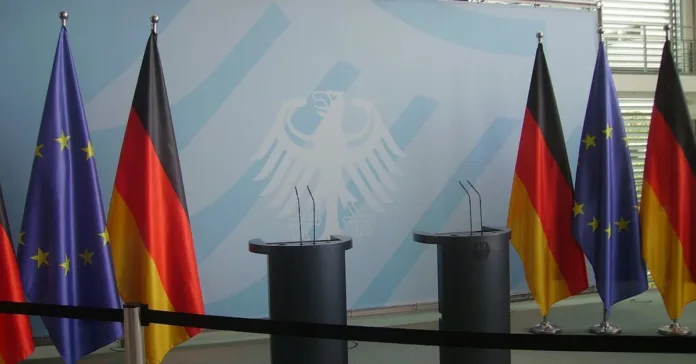In a move that has sent shockwaves through the cryptocurrency market, the German government continues its Bitcoin sell-off from its cache of Bitcoin (BTC) holdings over the past few weeks. This large-scale liquidation, amounting to nearly $1 billion worth of BTC, has placed significant selling pressure on the world’s largest digital asset, contributing to its dramatic price decline and the recent bitcoin crash and cryptocurrency crash. This bitcoin news has sparked concerns about a potential bitcoin reversal and the government’s motivations to sell bitcoin.
The Origin of Germany’s Bitcoin Stash
The bitcoin Germany story can be traced back to its seizure of a massive haul of the cryptocurrency in 2013. During that year, authorities in the eastern German state of Saxony seized bitcoin close to 50,000. These seized bitcoin, worth around $2.2 billion at the time, from the operators of the infamous movie piracy website Movie2k.to as part of criminal investigations, was labeled as “the most extensive confiscation of Bitcoins by law enforcement authorities in the Federal Republic of Germany to date.”
Related Read: German Parliament Member Urges Government To Cease Selling Bitcoin
Ongoing Bitcoin Sell-Off by the German Government
Over the past few weeks, the German government has been actively offloading its substantial Bitcoin holdings as part of a potential emergency sale or strategic overhaul. According to on-chain data tracked by blockchain analysis firm Arkham Intelligence, the government has made several significant BTC transfers to various cryptocurrency exchanges, including Coinbase, Bitstamp, and Kraken, engaging in both direct spot market sales and OTC sales.
June 2024 Sell-Off
In June 2024, the German government’s Federal Criminal Police Office (Bundeskriminalamt or BKA) sold 900 Bitcoins, worth approximately $52 million at the time, as part of its digital assets management strategy. This initial sale marked the beginning of the government’s efforts to liquidate its confiscated assets.
July 2024 Sell-Off
The crypto selling continued in early July 2024, with the government offloading an additional 3,000 Bitcoins, valued at roughly $172 million. This was followed by a further crypto sell of 2,739 Bitcoins, equivalent to $155 million, just a few days later, as reported in the daily finance news and strategy news.
Ongoing Transfers and Current Holdings
In total, the German government has transferred a staggering 21,346 Bitcoins through wallet transfers, valued at over $1.22 billion, within the past 24 hours alone, according to the latest bitcoin latest news and crypto latest news. However, the government has also re-accumulated 5,365 Bitcoins, worth approximately $304 million, at a lower average price during this period, potentially as part of a treasury diversification strategy.
As of the latest available data, the German government still holds a substantial amount of Bitcoins, with an estimated 27,461 BTC, valued at around $1.55 billion, remaining in its possession, as reported in the btc news and german news.
The Impact on the Bitcoin Market
The German government’s massive Bitcoin offload has had significant market impacts on the cryptocurrency market. In tandem with these sales, Bitcoin has seen a dramatic price decline, plummeting below $55,000 on Friday, July 7th, 2024, reaching its lowest level since February of the same year.
Market Volatility and Sentiment
The on-chain movements of the German government’s Bitcoin holdings have sparked market panic and volatility. Blockchain analytics platform Lookonchain has noted that the government’s transfers to centralized exchanges (CEXs) for direct spot market selling, rather than through over-the-counter (OTC) channels, have contributed to the negative market sentiment.
Potential Reasons for the Sell-Off
While the German government has not provided an official explanation for its decision to sell off its Bitcoin holdings, some industry experts have speculated on possible reasons:
- Regulatory Compliance: The government may be liquidating the seized Bitcoins to comply with regulatory requirements or to repatriate the funds into the traditional financial system as part of its economic policy.
- Portfolio Diversification: The government may be seeking to diversify its asset portfolio and reduce its exposure to the volatile cryptocurrency market, potentially due to budget shortfalls or changes in its state budget.
- Economic Considerations: The sell-off could be a strategic move by the German government to raise funds or to potentially influence the broader cryptocurrency market dynamics, possibly in response to the recent Mt. Gox repayments.
Reactions and Criticisms
The German government’s decision to sell its Bitcoin holdings has not been without controversy. Some industry figures and policymakers have expressed their disapproval of the move, arguing that the government should be holding onto the cryptocurrency as a strategic reserve asset and a matter of national security.
Calls for Holding Bitcoin as a Strategic Reserve
Joana Cotar, a member of the German Bundestag (parliament), has publicly criticized the government strategy to sell its Bitcoin. Cotar believes that the government should be holding the cryptocurrency as a “strategic reserve currency” rather than liquidating it, as she sees it as a potential hedge against inflation and a means of promoting economic sovereignty and innovation.
Invitation to Discuss Bitcoin’s Potential
Cotar has even invited German Chancellor Olaf Scholz, Finance Minister Christian Lindner, and Saxony Minister President Michael Kretschmer to attend a lecture on Bitcoin’s potential, hosted by prominent Bitcoin influencer Samson Mow, in an effort to change the government’s stance on the matter.
Potential Implications and Outlook
The German government’s massive offloading of Bitcoin has raised several questions and concerns within the cryptocurrency community. The on-chain movements and the government’s apparent intent to create market panic have led to speculation about the potential long-term implications of these actions.
Impact on Bitcoin Price and Volatility
While the German government’s Bitcoin sales represent a relatively small fraction of the overall Bitcoin market, the psychological impact on traders and the potential for further market manipulation have contributed to the significant price drop observed in recent days. However, industry experts believe that these fluctuations are likely to be temporary and that the long-term bullish trend for Bitcoin remains intact, potentially presenting a Wall Street buying opportunity.
Potential Operational Disorganization
The German government’s approach to the sell-off, which has included both direct spot market sales and OTC transactions, has led some observers to question the level of coordination and organization within the various government agencies responsible for managing the cryptocurrency holdings. The back-and-forth movements of Bitcoin to and from centralized exchanges have fueled concerns about the government’s overall strategy and decision-making process.
Broader Implications for Cryptocurrency Adoption
The German government’s actions have also sparked discussions about the broader implications for the adoption and mainstream acceptance of cryptocurrencies. Some industry experts argue that the government’s willingness to liquidate a substantial portion of its Bitcoin holdings could undermine public confidence in the digital asset and potentially hinder wider cryptocurrency adoption.
Conclusion
The German government’s massive sell-off has undoubtedly shaken the cryptocurrency market, contributing to the recent price decline and volatility. While the government’s motivations for these actions remain a subject of speculation, the event has raised important questions about the role of governments in the cryptocurrency ecosystem and the potential long-term implications for the broader adoption of digital assets.
As the situation continues to unfold, the cryptocurrency community will likely closely monitor the German government’s next moves and their impact on the market. The ongoing debate surrounding the government’s decision to sell its Bitcoin holdings rather than holding it as a strategic reserve asset is likely to continue, with industry stakeholders and policymakers weighing in on the potential consequences and the broader implications for the future of digital currencies.













